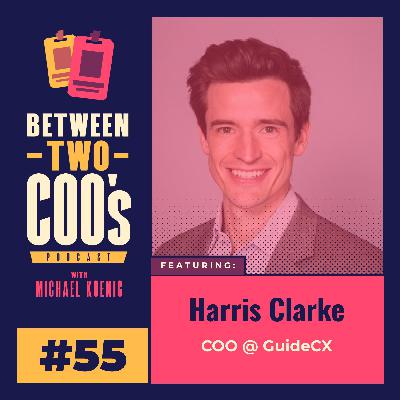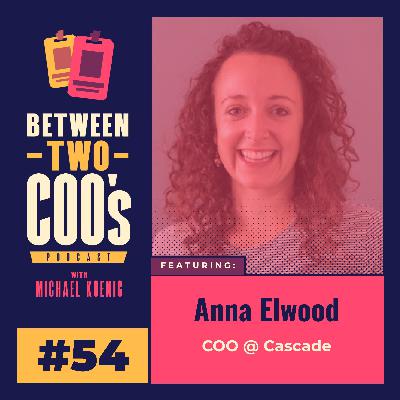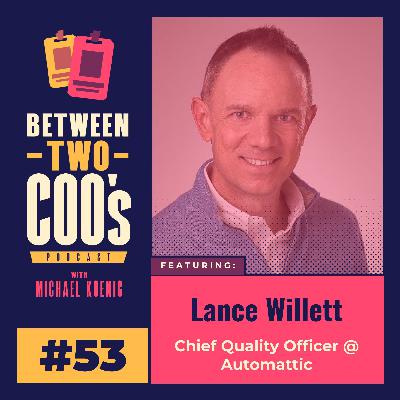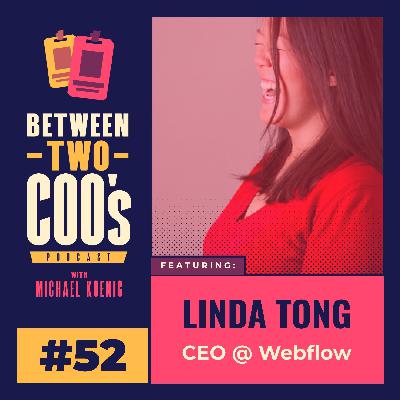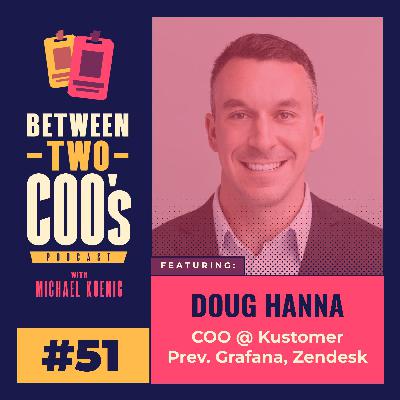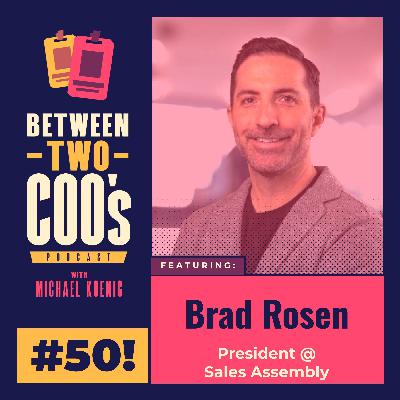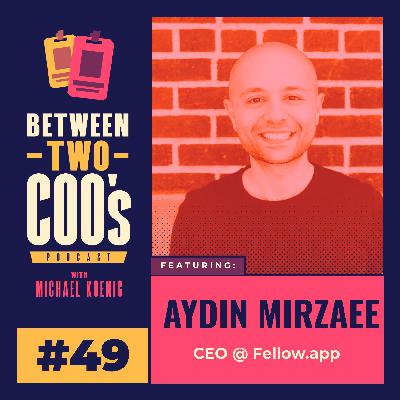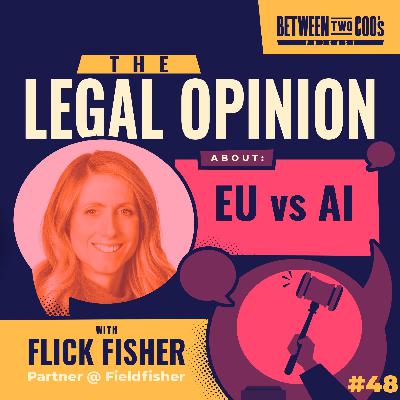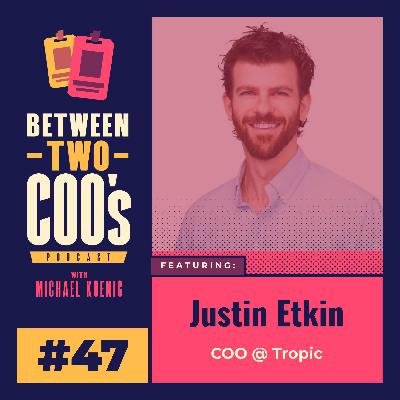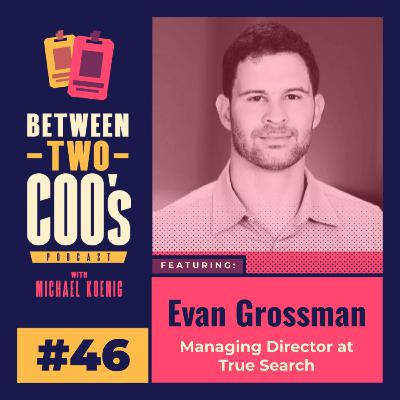Discover Between Two COO's with Michael Koenig
Between Two COO's with Michael Koenig

Between Two COO's with Michael Koenig
Author: Michael Koenig
Subscribed: 4Played: 67Subscribe
Share
© 2021 Between Two COO's
Description
Between Two COO's brings incredible Chief Operating Officers together to share their insights, advice, and crazy stories. Learn from current and former COO's from companies like Tucows, Automattic, Shippo, Chopra Global, & VC firms.
59 Episodes
Reverse
Get 90 Days of Fellow's incredible AI notetaker for free at fellow.ai/cooGuest: Seth LevineBook: Capital EvolutionPodcast: Between Two COOsHost: Michael KoenigWhat we coverWhy Seth wrote Capital Evolution and why nowWhy today’s economic shift is structural, not cyclicalHow power has moved from public institutions to businessesWhat companies are being asked to carry that they weren’t built forHow AI fits into this broader realignmentEarly signals that companies are adapting well to AIWhat strong executive teams do differently during uncertaintyCommon leadership traps when change happens too fastA real crisis from a portfolio company and what the executive team did wellThe new leadership muscle operators need for the next decadeEpisode Chapters / Timestamps00:00 – Introduction01:40 – Seth’s 30-second pitch for Capital Evolution04:05 – Why this shift is structural, not cyclical07:20 – What’s broken in the current economic model11:00 – The power shift from government to business15:10 – What leaders are quietly losing18:45 – Where AI fits into this realignment23:30 – What boards see when AI adoption works28:05 – How strong executive teams handle uncertainty33:40 – Leadership traps during rapid change38:10 – A crisis inside a portfolio company44:00 – The new muscle operators must build48:50 – A moment Seth never thought he’d see
Get Brad's new book, Give First.00:00 — Cold open: “Something new is fucked up in my world every day”02:00 — The Yoda t-shirt story + the mythology of Brad Feld04:00 — “Give First” vs. “Pay it Forward”: philosophy, not obligation07:00 — Why giving isn’t altruism — and how it works in complex systems10:00 — Positive-sum vs. zero-sum: tennis, trust, and long games13:00 — Does giving create outcomes, or just energy?16:00 — Why Brad writes books: longform thinking as meaning-making20:00 — Searching for meaning through mentorship and reflection23:00 — “I hate the phrase pattern recognition” — mentorship done right28:00 — The power dynamic between founders and mentors32:00 — Management through commitment, not control35:00 — Agile as an operating system for accountability38:00 — Emotional intelligence and the role of executive coaches41:00 — Mentor vs. coach vs. therapist vs. advisor45:00 — Trust as the foundation of all high-leverage relationships47:30 — Wild story: when the second floor of Sphero’s building collapsed52:00 — “They can’t kill you and they can’t eat you” – Len Fassler’s advice55:00 — Closing thoughts on being the Bill Murray of venture capital
This episode goes deep into the mechanics of scaling a company from steady growth to breakout velocity. Peter shares how Spreedly quadrupled ARR growth in his first year without increasing OPEX, why the “right people pointed at the right problems” is everything, and how to decide which problems are existential versus learn-as-you-go.We dissect how go-to-market organizations evolve from $20M to $100M ARR, the power of focus and role separation, and how to keep silos aligned around one customer story.Peter also explains the shift from “payments orchestration” to “open payments” and how Spreedly’s position as the original player in the space gives them unique leverage. We walk through the future of agentic commerce, Google’s new agent-to-agent payments protocol, and what it means when agents can transact faster than any human could ever shop.We close out with the Dodgeball acquisition, a primer on fraud orchestration, and a wild story about working an entire night shift at a nightclub during a meltdown launch.Topics Covered:How Peter defines the journey to presidencyThe “right person, right problem” frameworkOne-way vs two-way doors for staffing big problemsHow to scale a GTM org from $20M to $100MWhy open payments replaces orchestrationSpreedly’s unique market position and 15-year head startAgent to agent commerce and Google’s new payments protocolHow AI changes the velocity of money movementFraud orchestration and Spreedly’s acquisition of DodgeballBalancing profitable growth vs growth at all costsPerception vs reality in leadershipPeter’s wildest “I never thought I’d see that” story
Get 90 Days of Fellow's AI Meeting Assistant FREE at fellow.ai/coo This week on Between Two COOs, Michael sits down with Harris Clarke, COO at GuideCX, to talk about what steady leadership actually looks like inside fast-changing companies.Harris started his career in protocol and operations for the U.S. Department of State, where “process” wasn’t just a buzzword — it was survival. He shares how those lessons translate to running a modern SaaS organization and why purpose, process, and payoff are the anchors of any good meeting.They dig into:How government discipline shaped Harris’s operating styleThe “three P’s” framework for productive meetingsWhy decision speed is overrated — and what Harris means by “Did anyone die or go to jail?”What he learned from executive coaching and board feedbackHow GuideCX built a new product category around customer onboardingHow AI is quietly reshaping how he manages teams and prepares communicationsWhy calm is a competitive advantage during crisis moments like SVBMichael also gives context at the top: this episode was recorded across two sessions, after a recording issue mid-interview (and yes, he’s now officially a Riverside convert).It’s a conversation about building trust, running tight systems, and keeping your head when everything around you is changing.Harris Clarke on LinkedInGuideCXMichael Koenig on LinkedInBetween Two COO's WebsiteEpisode Website
From Zocdoc to Cascade, COO Anna Elwood breaks down the systems, rhythms, and AI tools that turn chaos into execution. In this episode of Between Two COOs, Michael sits down with Anna Elwood, COO of Cascade, the strategy-execution platform helping companies turn plans into results.Anna shares how she evolved from Broadway actor to operator, scaling companies like Zocdoc, Knotel, and Teachable before joining Cascade to build the muscle of strategy execution. She explains how to create an “operating rhythm” that keeps teams aligned across time zones, the tension between governance and red tape, and how Cascade helps leaders link vision to measurable execution.The conversation dives deep into AI’s role in operations, the future of hybrid work, and what it takes to move from chaos to clarity in a global startup. Anna’s storytelling — especially her account of leading through Superstorm Sandy — highlights what real-time operational leadership looks like when everything goes sideways. Timestamps00:00 – Intro & sponsor01:00 – The chaos of Superstorm Sandy02:00 – Anna’s journey: from theater to tech06:00 – The making of a generalist10:00 – Joining Cascade and fixing retention11:00 – Creating a “working rhythm”14:00 – Governance vs. red tape17:00 – The 5 pillars of strategic maturity19:00 – Turning strategy into execution24:00 – How Cascade uses AI internally28:00 – OKRs, KPIs, and strategy frameworks33:00 – Who owns strategy?36:00 – Rebuilding a business overnight43:00 – Closing thoughts Between Two COO's - https://betweentwocoos.com Episode Website - https://betweentwocoos.com/anna-elwood-coo-cascadeAnna Elwood on LinkedIn - https://www.linkedin.com/in/annaelwoodMichael Koenig on LinkedIn - https://linkedin.com/in/michael-koenig514
Try Fellow's AI Meeting Copilot - 90 days FREE - fellow.app/cooGuest: Lance Willett, Chief Quality Officer at AutomatticTopics Covered:How Automattic’s open source culture evolved over 20 yearsWhat a Chief Quality Officer actually does—and why it mattersQuality = Craft × Context, and how that feedback loop scalesAutomattic’s AI strategy: support bots, contextual UI, and site generationThe importance of tools like Linear and Storybook in enforcing qualityHow Automattic balances speed, risk, and governance with AI experimentationLessons from stabilizing Tumblr during its post-acquisition rebootPrioritization and the dangers of unbounded optimismLeadership takeaways from working closely with Matt Mullenweg🕰️ Time Map00:00 – 03:00: Intro and Lance’s journey from freelancer to Automattic03:00 – 06:30: How Automattic’s open source ethos evolved over 20 years06:30 – 10:30: What it means to be a Chief Quality Officer—Craft × Context10:30 – 15:00: Scaling quality: repo sprawl, signal vs. noise, and auditing15:00 – 20:00: UX details like forms, performance, and speed as quality levers20:00 – 24:00: Driving culture change with standard tooling (Linear, Storybook)24:00 – 28:00: Guardrails for AI experimentation and internal governance28:00 – 32:00: AI at Automattic: support bots, contextual UI, AI site builder32:00 – 36:00: Competing with Webflow, Wix, and Squarespace through innovation36:00 – 38:30: Balancing ecosystem contribution with revenue and investor pressure38:30 – 41:00: Lessons from stabilizing Tumblr: cost, culture, safety, turnover41:00 – 44:00: Automattic’s long-term challenge: bounded optimism and focus44:00 – 46:30: Leadership wisdom from Matt Mullenweg: details always matter46:30 – 49:00: Lance’s $250K mistake—and what it taught him about leadership https://brodo.com/ (our other sponsor 😂)https://fullstackleader.blog/ (work topics: WordPress, tech, productivity, quality, & more)https://lance.blog/ (fun stuff: poems, stories, links; photos “on the go”)https://linear.app/https://clay.earth/ via https://automattic.com/2025/06/12/automattic-welcomes-clay/ Companies with dedicated quality efforts:https://anthonyhobday.com/blog/20240914.html > While fixing small bugs might not 10x your growth overnight> Not fixing them will make 10x growth impossible over timeCredit: Casey Winters – someone you should have on this show if you haven’t alreadyhttps://caseyaccidental.com/ Episode webpage - https://www.betweentwocoos.com/automattic-chief-quality-officer-lance-willett-wordpressMichael Koenig - https://linkedin.com/in/michael-koenig514 Between Two COO's - https://betweentwocoos.com
Get 90 days of Fellow's AI meeting assistant at fellow.app/cooWhy Linda still codes on weekends — and what it teaches her about the future of AI (6:00)How AI is changing what Webflow builds — and how fast they build it (3:30–13:00)What happens when websites are no longer built just for humans (14:00)The rise of AEO (Answer Engine Optimization) and what it means for ops (17:00–21:00)Favorite LLMs and workflows — from Claude Sonnet to custom GPTs (23:00–26:00)How Linda builds a culture of innovation — and why bad ideas are worth celebrating (29:00)Leading through operational ambiguity and defining what to say “no” to (49:00)How product thinking helps Linda prioritize and run the business (54:00)Creating an actual in-office “innovation lab” — and what worked (1:04:00)Wild story: how her team navigated the SVB collapse weekend (1:08:00)
Get 90 days of Fellow's AI meeting assistant at fellow.app/cooIn this episode, Doug and I cover:Why “AI agent” is more than just a buzzwordThe difference between deflection and resolution in AI-powered supportHow Kustomer structures RevOps, GTM, and forecastingWhat it means to operate with high-context vs. generic playbooksHow Doug thinks about team structure, ownership, and cross-functional clarityPredictions for agent-to-agent communication: “Your AI agent will talk to my AI agent—and we’ll both just read the summary.”Timestamps:(02:00) Defining agentic AI in customer service(06:30) From deflection to resolution: Kustomer’s AI in action(10:15) How AI is changing the org chart and team design(14:00) The problem with low-context playbooks(17:45) RevOps structuring and ownership(22:00) Forecasting: visibility vs. execution(27:00) AI tooling, integration, and buyer psychology(31:00) Agent-to-agent interactions and AI futurecasting(34:30) What Doug’s watching next in ops and AI LinksDoug Hanna on LinkedIn - https://www.linkedin.com/in/douglashanna1/Kustomer - https://www.kustomer.com/Michael Koenig on LinkedIn - https://linkedin.com/in/michael-koenig514Between Two COO's - https://betweentwocoos.com
Get 90 days free with Fellow's AI Meeting Assistant - https://fellow.app/coo Key Takeaways:RevOps aligns and optimizes sales, marketing, and customer success, ensuring efficient and sustainable growth.Effective RevOps requires balancing strategic planning, data-driven analytics, and tactical execution.Successful RevOps integration hinges on clear communication, cultural alignment, and strategic hiring decisions.AI is poised to significantly impact RevOps by improving efficiency, though human judgment remains crucial.Metrics and KPIs in RevOps must directly correlate to revenue growth, profitability, and organizational efficiency.Brad emphasizes proactive disruption, transparency, and alignment to navigate the rapid evolution of sales operations. Timestamps:(02:00) What is RevOps and how Brad transitioned into it from finance(07:00) Common misconceptions and early mistakes in RevOps(11:00) Building a robust RevOps foundation and data hygiene(15:00) Creating alignment across sales, marketing, and customer success(20:00) Key metrics and strategic decision-making in RevOps(24:00) AI’s impact on RevOps and potential pitfalls(30:00) Real-world experiences with AI-powered sales calls(33:00) RevOps vs. SalesOps and defining terms clearly(36:00) Advocating for RevOps budgets and demonstrating value(40:00) Lessons learned about effective communication and internal alignment Links:90 Days Free of Fellow's AI Meeting Assistant: https://fellow.app/cooBrad Rosen on LinkedIn: https://www.linkedin.com/in/bradrosen1/Michael Koenig on LinkedIn: https://www.linkedin.com/in/michael-koenig514/ Sales Assembly: https://www.salesassembly.com/Between Two COO's: https://betweentwocoos.com Episode URL: https://www.betweentwocoos.com/sales-assembly-president-brad-rosen-on-unlocking-growth-and-why-revops-is-critical-for-sustainable-scaling
Try Fellow's AI Meeting Copilot - 90 days FREE - fellow.app/cooTimestamps:(02:00) Fellow’s shift from productivity tool to AI assistant.(07:00) Implementing large-scale organizational change.(13:00) Managing change and internal communications.(20:00) Moving toward an agentic, automated workflow future.(23:00) Unexpected real-world AI uses at Fellow.(29:00) Privacy, security, and enterprise-grade compliance.(33:00) Selecting and utilizing LLMs and managing AI economics.(36:00) How to build an AI-first company from scratch.(40:00) Why existing companies struggle to adopt AI effectively.(44:00) Practical advice on starting AI implementation in established companies. Key Takeaways:Fellow transformed from a productivity tool into a strategic, AI-powered assistant helping organizations automate meetings, streamline workflows, and derive actionable insights.Aydin emphasizes the necessity of disruptive innovation, detailing Fellow’s cultural shift toward agility and fearlessness to stay ahead in the AI-driven landscape.Security, privacy, and compliance remain core to Fellow, with advanced governance and redaction features designed specifically for internal enterprise meetings.Real-world AI applications include automatically generating meeting summaries, tracking and following up on action items, updating CRM and project management systems, and creating customized client communications.Insights on successful AI adoption: Aydin highlights practical steps organizations should take, from establishing AI councils to experimenting actively with new technologies and leveraging external AI consultants. LinksTry Fellow's AI Meeting Copilot - 90 days FREE - fellow.app/cooEpisode URL: https://betweentwocoos.com/the-bold-pivot-from-meetings-to-ai-with-aydin-mirzaee-ceo-of-fellowBetween Two COO's website: https://betweentwocoos.com Michael Koenig on LinkedIn: https://linkedin.com/in/michael-koenig514Aydin Mirzaee on LinkedIn: https://www.linkedin.com/in/aydinmirzaee/
Try Fellow's AI Meeting Copilot - 90 days FREE - fellow.app/cooAI and Privacy: Navigating the EU's New AI Act with Flick FisherIn this episode of Between Two COOs, host Michael Koenig welcomes back Flick Fisher, an expert on EU privacy law. They dive deep into the newly enacted EU Artificial Intelligence Act and its implications for businesses globally. They discuss compliance challenges, prohibited AI practices, and the potential geopolitical impact of AI regulation. For leaders and operators navigating AI in business, this episode provides crucial insights into managing AI technology within regulatory frameworks.00:00 Introduction to Fellow and AI Meeting Assistant01:01 Introduction to Between Two COOs Episode02:08 What is the EU’s AI Act?03:42 Prohibited AI Practices in the EU07:46 Enforcement and Compliance Challenges12:18 US vs EU: Regulatory Landscape29:58 Impact on Companies and Consumers31:55 Future of AI RegulationBetween Two COO's - https://betweentwocoos.com Between Two COO's Episode Michael Koenig on LinkedInFlick Fisher on LinkedInFlick on Data Privacy and GDPR on Between Two COO'sMore on Flick's take of the EU's AI Act
Don't forget to check out www.fellow.app/coo for a 90-day free trial of their AI Meeting Assistant.[00:00] Introduction – Michael introduces Fellow as a trusted AI meeting assistant.[01:00] Welcome to Between Two COOs – Introducing Justin Etkin and Tropic.io.[02:00] The evolution of procurement – From cost-cutting to strategic value creation.[05:00] When should companies start formalizing procurement?[07:00] Common mistakes businesses make in procurement.[10:00] Using data and AI to improve procurement efficiency.[12:00] Negotiation strategies and dealing with vendors.[16:00] The role of AI in procurement and automation potential.[20:00] How companies are shifting towards integrated procurement platforms.[23:00] The intersection of procurement and legal, finance, and security.[28:00] Justin’s wildest COO experience – Painting walls before an office move-out.[30:00] Closing thoughts – Where to follow Justin and learn more about Tropic.io.Tropic - https://www.tropicapp.io/Between Two COO's - https://betweentwocoos.com Episode URL - https://betweentwocoos.com/tropic-coo-justin-etkinMichael Koenig - https://linkedin.com/in/michael-koenig514Justin Etkin - https://www.linkedin.com/in/justintropic/Don't forget to check out www.fellow.app/coo for a 90-day free trial of their AI Meeting Assistant.
This episode is powered by Fellow AI Meeting Assistant. Get 90 days free at fellow.app/cooKey Takeaways:• Hidden C-Suite Job Market: The majority of C-level roles are filled through networking, talent partners, and executive recruiters before job postings are even considered.• Role of Networking: Building strong relationships within your industry and maintaining top-of-mind positioning with decision-makers is crucial.• Non-Traditional Candidates: Market shifts, such as the rise of AI and post-COVID changes, are creating opportunities for candidates from unconventional backgrounds.• AI in Executive Recruiting: True Search uses AI-driven tools like Thrive to manage data at scale, identifying the best candidates more efficiently.• Career Advice for COOs: Gaining hands-on experience in both value creation (product/tech) and value capture (go-to-market) functions can prepare COOs for CEO roles.• Culture Fit: Evaluating culture fit involves assessing how a candidate aligns with and enhances the company’s existing culture without disrupting it.• The Board Member Journey: To be considered for a board position, candidates need specialized expertise and experience managing boards or navigating complex organizational challenges. Notable Quotes:• “Position yourself within your network as someone ready to step into a C-level role—start those conversations early.”• “If everyone’s a thought leader, no one is a thought leader. Focus your voice and expertise on what truly adds value.”• “To be a successful CEO, you need to have hands-on experience in both product and go-to-market functions.” Evan’s Unforgettable Moments:• Two finalists in a CEO search accidentally meeting mid-interview process due to scheduling overlap—illustrating the small-world nature of the C-suite ecosystem.• Delivering news to two candidates while they stood together on the sidelines of their kids’ soccer game, showing how interconnected the executive world can be. Be sure to check out Fellow's AI Meeting Assistant and get 90 days free at fellow.app/coo.
Episode OverviewIn this episode of Between Two COOs, host Michael Koenig interviews Jon Mark, COO of Vestwell, a leading provider of digital platforms for workplace savings and investment programs. Vestwell supports nearly 25,000 small businesses, over a million savers, and $25 billion in assets under management across all 50 states.They discuss Vestwell’s mission to close the savings gap, its innovative approach to financial wellness, and Jon’s career journey from Bridgewater to COO at Vestwell. Key Topics Covered1. Vestwell’s Vision and Product Offerings• Simplifying workplace savings through innovative digital platforms.• Expanding beyond 401(k)s to include student debt paydown, 529 education savings, and more.• Recent acquisition of Gratifi from Morgan Stanley to help employers support student loan repayment.2. The Retirement Crisis• Addressing the lack of sufficient retirement savings in the U.S.• The role of state-sponsored retirement programs and employer-provided plans.• Larry Fink’s warning about the coming retirement flood.3. AI in Financial Wellness• Vestwell’s integration of AI to enhance user experiences, including a new AI chatbot.• Using AI to simplify complex financial concepts and empower financial advisors.4. Jon Mark’s Career Path• Transition from VP of Strategy to COO at Vestwell.• Mentorship, curiosity, and deep problem-solving as key drivers of career progression.• Lessons learned from working at Bridgewater and applying them to operations at Vestwell.5. Navigating Risk and Strategy• Managing risk by tying decisions to money, time, and outcomes.• Balancing mission and growth by focusing on small and medium-sized businesses.• Using a “chassis” approach to consolidate financial tools for broader impact.6. Operational Challenges in a Regulated Industry• Overcoming complex regulatory requirements.• How Vestwell builds scalable, efficient processes within strict constraints.7. The Role of the COO• A COO’s need to handle diverse domains—engineering, HR, healthcare, and more.• Strategies for managing imposter syndrome and fostering collaboration.• Building a transparent culture through metrics and regular communication.8. Mission-Driven Decision Making• How Vestwell aligns its strategy with its mission to close the savings gap.• Clear objectives, OKRs, and open communication as tools to drive alignment. Memorable Moments• Jon’s story about solving three major operational issues in one night before an acquisition deal closed.• Insights on how Vestwell is innovating in financial wellness while maintaining a mission-oriented approach. Key Quotes• “You can’t just approach problems with jargon—you need to deeply understand the substance.”• “Having a tangible North Star is critical. For us, it’s funded accounts—it’s the metric that matters most.”• “At the end of the day, strategy and tactics are just bets with different time horizons.” About the HostMichael Koenig is the host of Between Two COOs, a podcast that dives into the stories, strategies, and advice of today’s top Chief Operating Officers. Learn more at betweentwocoos.com.
In this episode of Between Two COOs, host Michael Koenig sits down with Valentin Gruber, COO of HomeToGo, to explore the inner workings of the vacation rental aggregator and its strategy. HomeToGo went public via a SPAC in 2021, reaching a valuation of $1.2 billion after raising $150 million in VC funding. Valentin shares insights into the company’s growth, its approach to balancing marketplace and software solutions, and the strategic importance of acquisitions. The discussion delves into leadership principles, decision-making frameworks, and how HomeToGo navigates market complexities while competing with giants like Airbnb. Valentin also provides an entertaining look at innovative cost-saving measures the company employed, highlighting the unique culture at HomeToGo. This episode is a must-listen for anyone interested in strategic growth, leadership, and the evolving landscape of the vacation rental market.00:00 Introduction to Between Two COOs00:16 Valentin Gruber's Background and Home2Go Overview01:01 Home2Go's Market Position and Public Listing01:57 Home2Go's Business Model Evolution05:16 Scale and Transactions at Home2Go07:19 Subsidiaries and Acquisitions15:36 Strategic Planning and Problem Solving22:39 Leadership and Company Culture24:20 Management Approach and Decision-Making Techniques25:45 Balancing Learning and Expertise28:59 The Importance of Pre-Reads in Decision Making32:41 Leaders Staying Connected to Problems33:54 Understanding SPACs and HomeToGo's Public Journey38:20 Strategic Use of SPAC Funds39:18 Evaluating and Executing M&A Deals42:05 Memorable Moments and Financial Discipline46:26 Conclusion and Farewell
Navigating Leadership and Innovation at School of Rock with Stacey RyanIn this episode of Between Two COOs, host Michael Koenig interviews Stacey Ryan, the COO of School of Rock - a global music school franchise. Stacey debunks a common misconception about the business's origin, noting it predated and inspired the 2003 film. She discusses the operational challenges of managing a global franchise, particularly through the COVID-19 pandemic, and highlights the innovative pivot to remote lessons and live-streamed shows. Stacey also delves into her role in founding Frontwoman.org, aimed at empowering women in leadership roles across various industries. The discussion covers her career trajectory, the importance of mentorship, operational strategies for scaling, and the significant impact of maintaining a supportive and innovative culture for both students and franchisees. 00:00 Welcome to Between Two COOs: Meet Stacey Ryan00:28 The Real School of Rock: Beyond the Movie00:52 Empowering Women Leaders: The Mission of Frontwoman.org02:10 Navigating Challenges: Pandemic Response and Innovation at School of Rock12:49 Operational Insights: Building a Global Music Education Empire25:21 Empowering the Next Generation: Talent Assessment and Retention31:25 Frontwoman.org: Championing Women's Leadership and Empowerment40:40 Closing Thoughts and Resources
Maximizing Meeting Efficiency and Navigating Management Challenges: Insights from Aidan Mizrahi of FellowThis episode delves into the complexities and potential inefficiencies of meetings in the professional world, emphasizing the staggering number of unproductive meetings held daily. Highlighting the innovative approach of Shopify in canceling recurring meetings to save significant time, the conversation introduces Fellow, a SaaS product aimed at optimizing meeting structures, agendas, and action items to enhance management processes. Aidan Mizrahi, the CEO of Fellow, shares his journey from being unaware of structured management processes to creating a platform that serves as a manager's co-pilot, focusing on the intricacies of managing differently for every team member and adapting over time. Furthermore, Mizrahi discusses the pivotal role of asynchronous meetings in remote work, the significance of setting meeting norms, and leveraging AI to improve efficiency and decision-making in organizations. The episode also explores the balance between security and innovation when integrating AI into business processes and concludes with Mizrahi sharing a personal anecdote on how AI has become a part of his daily routine for brainstorming and learning. 00:00 The Meeting Epidemic: Unveiling the Problem00:58 Introducing Fellow: The SaaS Revolutionizing Meetings01:42 A Deep Dive into Fellow's Origin and Mission01:50 From Startup to Acquisition: A Journey of Learning and Growth05:14 The Power of Structured Management Processes09:43 Implementing Effective Meetings at Scale with Fellow15:51 Optimizing Meetings for Action and Accountability20:00 Redefining Meeting Culture: Strategies for Efficiency29:06 Embracing Remote Work: The Future of Meetings32:37 Unlocking the Power of Asynchronous Meetings33:43 The Value of Time and Asynchronous Work35:18 Inside the Operations of Fellow: Mastering Efficiency35:44 The Art of Meeting Types and Decision Making40:21 Leveraging AI for Business Efficiency and Innovation45:58 Navigating AI Ethics and Security in Business48:34 AI Presentations: Sharing Knowledge and Inspiring Innovation56:03 The Impact of Super Managers Podcast on Leadership01:02:07 Exploring New Frontiers with AI: A Personal Experiment01:04:41 Connecting with the Community and Wrapping Up
Presented by Fellow.app. Streamline your meetings and make them more efficient and meaningful. Get Fellow for you and your team today. Head to https://fellow.app/coo/ to get started and start having better meetings. (00:12) Advice for CEOs and COOs This chapter welcomes Cameron Harold, the founder of COO Alliance and author of "The Second In Command," as we celebrate the release of his new book and examine its content, which serves as a guide for both CEOs and COOs. We explore Cameron's transition from COO to CEO, the mindset shifts that accompanied this change, and his insights into the balance between work and life. Cameron shares his experiences and lessons learned from running a business at a young age, including the importance of delegating, saying no, and focusing on the most critical tasks. The discussion also touches on how the book has already impacted the COO Alliance and the value it provides in understanding the CEO-COO dynamic. (12:37) Promoting From Within vs. Hiring Externally This chapter we explore the importance of creating a culture of continuous improvement within companies, akin to the mindset of elite athletes or performers. I share an anecdote about Patrick Roy to illustrate the resilience and determination that we aim to instill in our teams. We discuss strategies for fostering a safe environment where feedback is welcomed and viewed as a tool for growth, emphasizing that it's the systems, not individuals, that often need adjustment. We also touch on the sentimental value of sports heroes, as I recount a personal encounter with my childhood idol, Ken Dryden. Finally, I address the considerations involved in deciding whether to promote from within or hire externally for leadership roles, factoring in the individual's ability to complement the CEO's skills, their leadership qualities, and the strategic implications of such decisions, especially in companies with specialized knowledge or intellectual property. (17:24) Flexibility in Organizational Structure With AI This chapter examines the importance of flexibility in business operations and leadership. We explore the concept of a "bobbin' weave culture" where being too rigid can be detrimental, and the benefits of flowing like water, taking the path of least resistance towards the company's vivid vision. I discuss the necessity for leaders to align with core values and purposes, akin to a bobsled track, to guide the organization's journey. Additionally, we look at the challenges of introducing flexibility into rigid structures, using the example of Gerber Auto Collision's approach to acquisitions and the philosophy of "selling, not telling" to integrate new teams. The chapter also highlights the power of positive reinforcement and personal praise in leadership, drawing lessons from Howard Behar's practice of handwritten thank you notes at Starbucks, emphasizing the value of gratitude and recognition in driving employee success and satisfaction. (24:55) Exploring AI Tools and Admired COOs This chapter, we explore the significance of AI in the modern workplace, highlighting how our employees and CO Alliance members are encouraged to experiment with AI tools for one to two hours each week. We discuss the vast array of available AI applications, far beyond the widely mentioned ChatGPT, and the benefits of sharing experiences with these tools among teams to build momentum and enhance productivity. Examples include the transformative effects of AI on podcast production, such as using Descript to edit speech or Podium Stage for content creation. Additionally, we touch upon the importance of adaptability, illustrated by historical shifts in technology within NASA, and wrap up with admiration for influential COOs like Cheryl Sandberg and Matt Rawlings, noting how they exemplify effective leadership and innovation. (30:39) Leadership Lessons and Insights This chapter explores the contrasting leadership styles and trajectories of two COOs of 1-800-Got-Junk, with a focus on the impact of Eric Church's internal-facing, process- and people-centered approach as he grew the company from $70 million to $450 million, in stark contrast to my own media-facing, brand-building style during a different company growth phase. We also discuss the critical lesson of listening to team members, exemplified by a near-bankruptcy experience, and share a personal strategy for becoming a better listener by physically sitting on one's hands to encourage attentiveness. Finally, we examine the importance of asking systemic rather than symptomatic questions within leadership, illustrated by an anecdote involving Starbucks and the significance of maintaining operational systems for company-wide consistency. (37:02) Catch Up and Discuss Book Promotion This chapter celebrates the successful collaboration between CEOs and COOs as we unpack the critical dynamics of their partnership. I extend my gratitude to Cameron for sharing his insights and congratulate him on his new book, "Second in Command," a must-read for current and aspiring COOs, as well as CEOs seeking to hire their right-hand executive. We reflect on the nuances of the CEO-COO relationship and the importance of understanding each other's roles to foster a productive working environment. The discussion emphasizes the book's relevance for those looking to enhance their leadership teams and the overall health of their organizations. Thank you, Cameron, for joining me and enriching our listeners with your expertise. Links:Second In Command book - https://www.amazon.com/Second-Command-Unleash-Power-Your/dp/1544537603COO Alliance - https://cooalliance.com/Cameron Herold on LinkedIn - https://www.linkedin.com/in/cameronherold/Unique Ability by Dan Sullivan - https://uniqueability.com/Situational Leadership - https://en.wikipedia.org/wiki/Situational_leadership_theoryFellow.app - https://fellow.app/coo/Episode on Between Two COO's - https://betweentwocoos.com/41Michael Koenig on LinkedIn - https://linkedin.com/in/michael-koenig514/
Could the EU's new AI Act be the cornerstone of global AI regulation? That's what we're here to unpack with the expert insight of Flick Fisher, a leading privacy specialist and partner at Fieldfisher. As the digital age accelerates, the European Union is setting a precedent with the AI Act, a groundbreaking legislation designed to navigate the complex terrain of artificial intelligence. Flick and I dissect the Act's risk-based approach, dissecting the prohibited and high-risk AI systems categories, while giving a nod to the lighter touch on low-risk innovations. Our conversation delves into how this monumental regulation could shape data privacy and ethical AI practices on the world stage. Join us as we explore not only the definitions and distinctions within the AI Act but also its everyday implications for business operations, from HR decisions to the product safety landscape. With generative AI technologies like ChatGPT on the rise, understanding the nuances of this legislative framework has never been more crucial. We'll navigate the potential new compliance roles the Act may create and predict whether this regulatory move could become the global gold standard. Tune in for a comprehensive analysis that will equip COOs and business leaders with the foresight needed to thrive in an AI-governed future.(00:06) EU AI Act and Its Impact(11:50) Regulations and Definitions of AI(27:38) The Implications of the AI ActLinksEpisode link: https://www.betweentwocoos.com/the-eu-vs-ai-the-legal-opinion-with-flick-fisher-partner-at-fieldfisher/Flick's previous episode on GDPR: https://www.betweentwocoos.com/data-privacy-gdpr-flick-fisher/Flick on LinkedIn: https://www.linkedin.com/in/felicityfisher/Fieldfisher: https://www.fieldfisher.com/Between Two COO's: https://www.betweentwocoos.com/Michael Koenig on LinkedIn: https://linkedin.com/in/michael-koenig514/
Join us as Greg Strickland, COO of Productboard, and I explore the power of embracing new opportunities and the crucial balance between business outcomes and personal advancement. Greg shares his journey of growth through accepting challenges that push boundaries, and we reflect on the times when a strategic 'no' can pave the way for others' development and align with company goals. Listen in for an insightful discussion on the mentorship gap in early-stage companies and the trial-and-error learning that COOs like Greg navigate in the startup landscape. As the startup ecosystem continues to evolve, we dissect the influence of continuous learning on company culture, inspired by industry pioneers. I open up about the enriching experience of partnering with product and engineering-driven founders and how passion plays a decisive role in a startup's trajectory. We consider how startups like Productboard are innovating in operations and product management with the use of AI, highlighting the agility required to manage rapid change and the ethical considerations of handling customer data. In our conversation, we delve into the challenges of scaling up to the enterprise market and the importance of building a culture that can gracefully manage internal friction points. I share my approach to fostering empathy and collaboration across departments, revealing personal anecdotes and strategies for aligning diverse perspectives within a company. Tune in for a rich discussion full of practical insights, memorable moments, and tips for nurturing a successful startup environment. Follow Productboard on LinkedIn and check out their blog for more engaging content that can help steer your company towards growth and innovation. (00:06) Saying Yes to New Opportunities(08:14) Startups' Impact on Learning Culture(17:25) AI for Operations and Product Management(31:34) Navigating Enterprise Market Challenges and Feedback(37:07) Friction and Empathy in Customer Relations(45:25) Developing Empathy and Cross-Departmental Collaboration LinksGreg Strickland on LinkedIn: https://www.linkedin.com/in/gregstrickland/Episode Link: https://www.betweentwocoos.com/productboard-coo-greg-stricklandMatt Blumberg: https://startupceo.com/The Hard Things About Hard Things by Ben Horowitz: https://www.amazon.com/Hard-Thing-About-Things-Building/dp/0062273205Amp It Up by Frank Slootman: https://www.amazon.com/Amp-Unlocking-Hypergrowth-Expectations-Intensity/dp/1119836115/Radical Candor by Kim Scott: https://www.amazon.com/Radical-Candor-Revised-Kick-Ass-Humanity/dp/1250235375Michael Koenig on LinkedIn: https://www.linkedin.com/in/michael-koenig514/





